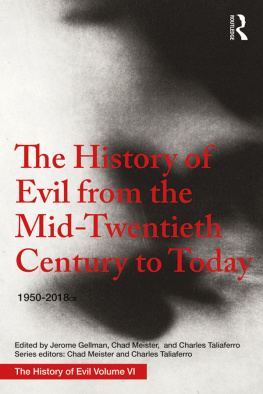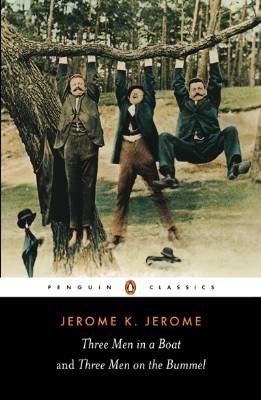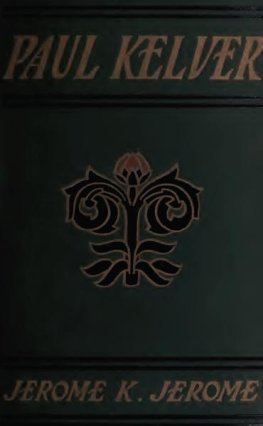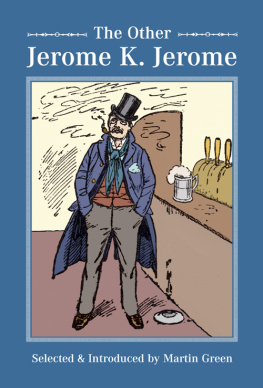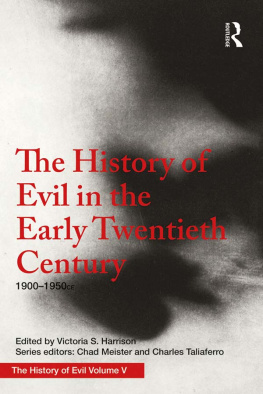Jerome Gellman - The History of Evil from the Mid-Twentieth Century to Today: 1950-2018
Here you can read online Jerome Gellman - The History of Evil from the Mid-Twentieth Century to Today: 1950-2018 full text of the book (entire story) in english for free. Download pdf and epub, get meaning, cover and reviews about this ebook. year: 2018, publisher: Routledge, genre: Politics. Description of the work, (preface) as well as reviews are available. Best literature library LitArk.com created for fans of good reading and offers a wide selection of genres:
Romance novel
Science fiction
Adventure
Detective
Science
History
Home and family
Prose
Art
Politics
Computer
Non-fiction
Religion
Business
Children
Humor
Choose a favorite category and find really read worthwhile books. Enjoy immersion in the world of imagination, feel the emotions of the characters or learn something new for yourself, make an fascinating discovery.
- Book:The History of Evil from the Mid-Twentieth Century to Today: 1950-2018
- Author:
- Publisher:Routledge
- Genre:
- Year:2018
- Rating:5 / 5
- Favourites:Add to favourites
- Your mark:
- 100
- 1
- 2
- 3
- 4
- 5
The History of Evil from the Mid-Twentieth Century to Today: 1950-2018: summary, description and annotation
We offer to read an annotation, description, summary or preface (depends on what the author of the book "The History of Evil from the Mid-Twentieth Century to Today: 1950-2018" wrote himself). If you haven't found the necessary information about the book — write in the comments, we will try to find it.
Jerome Gellman: author's other books
Who wrote The History of Evil from the Mid-Twentieth Century to Today: 1950-2018? Find out the surname, the name of the author of the book and a list of all author's works by series.
The History of Evil from the Mid-Twentieth Century to Today: 1950-2018 — read online for free the complete book (whole text) full work
Below is the text of the book, divided by pages. System saving the place of the last page read, allows you to conveniently read the book "The History of Evil from the Mid-Twentieth Century to Today: 1950-2018" online for free, without having to search again every time where you left off. Put a bookmark, and you can go to the page where you finished reading at any time.
Font size:
Interval:
Bookmark:
Pacifism and evil
Andrew Fiala
Pacifism is a family resemblance term that can include a variety of commitments: from opposition to war to opposition to all violence, even harms that are done to animals. These commitments can be grounded in various ways in deontological or consequentialist approaches to ethics. For Russell, what matters most in ethics are the consequences; and he holds out the possibility that the evils of war may be justified, if war were to produce some benefit.
A consequentialist pacifist, such as Russell, tends to think that for the most part wars are not justifiable. This is especially true in the era of aerial bombardment and nuclear weapons, where civilian casualties are likely. After the Second World War (in 1955), Russell joined together with Albert Einstein and several other prominent intellectuals to write a manifesto against nuclear war, stating that it is manifestly wrong because it causes massive harmful consequences to noncombatants. But even before witnessing the destruction of the Second World War, Einstein had expressed his own variety of what he called militant pacifism.question of personal violence. Moreover, the badness of war, understood in consequentialist terms, is relative to the circumstances. A pacifism of this sort focuses on specific details and circumstances and shies away from the more metaphysical claim that war is always evil. Pacifists who claim that war is absolutely evil are pointing at something deeper than the harms and suffering caused by war. Absolute pacifists, who use the language of evil to condemn war, tend to ground their critique of war in a deontological principle (such as never deliberately kill) or in some version of divine command (with the authority of God backing up the commandment never to deliberately kill). For absolute pacifists, war remains evil, even if it produces good consequences. We will discuss absolute pacifism subsequently. But before doing so, we must more carefully define the term evil.
Those who claim that war is evil usually mean that war is a moral evil and not merely a natural evil, as these terms are employed by theologians: moral evils are acts done by agents in deliberate contravention of some moral rule; natural evils are bad things that happen in nature. Moral evil occurs when one deliberately turns away from what is good. Augustine describes this as a defection from the good in City of God : the defection of the will is evil, because it is contrary to the order of nature, and an abandonment of that which has supreme being for that which has less. If war is evil, in this sense, it must involve a deliberate choice to will evil, in opposition to a moral prohibition against war.
Kant describes war as evil in a spirit that is similar to Russells. In a footnote in his Religion book, Kant calls war the scourge of mankind and concludes:
War, although not incurably evil as the tomb of universal autarchy (or, for that matter, as a federation of peoples formed in order to keep despotism from being abandoned), yet does, as one ancient said, produce more evil human beings than it removes.
In a similar passage in his essay Perpetual Peace, he reiterates this with a quote from the Greeks: What makes war such a bad thing ( schlimm ) is that it creates more evil people ( bse Leute ) than it does away with. Kant uses the adjective bse here to describe the people produced by war: the idea seems to be that the badness of war is that it produces evil people. In the Concluding Remark to his Conjectural Beginning of Human History, Kant states:
One must admit that the greatest ills that oppress civilized peoples stem from war, yet to be sure less from one that actually is or has been than from the never relenting and even ceaselessly increasing armament for future war.
Although Kant envisioned a world of perpetual peace based upon a federation of peace or league of nations, he reluctantly admitted that war would still be necessary even though he maintains that war should be fought within parameters that loosely correlate to those of the just war tradition. One significant problem for Kant would appear to be that killing a soldier (or sending one to war) would appear to be an example of using a person as a means to an end. It may be that the evil of war is that the political necessity of war leads us to use persons in this way.
The just war tradition has struggled with that problem. Augustine, one of the sources of the just war tradition, believed that war could be justified, as does Kant, even though he saw that there could be evil in war. In a much-quoted passage from Book 22 of Contra Faustum , Augustine explains that war is only evil when it fails to be undertaken in obedience to God or when it is an expression of wrongful intentions.
What is the evil in war? ( Quid enim culpatur in bello? ) Is it the death of some who will soon die in any case, that others may live in peaceful subjection? This is mere cowardly dislike, not any religious feeling. The real evils in war ( haec sunt quae in bellis iure culpantur ) are love of violence, revengeful cruelty, fierce and implacable enmity, wild resistance, and the lust of power, and such like; and it is generally to punish these things, when force is required to inflict the punishment, that, in obedience to God or some lawful authority, good men undertake wars, when they find themselves in such a position as regards the conduct of human affairs, that right conduct requires them to act, or to make others act in this way.
Although this frequently cited translation uses the term evil, Augustine himself does not use the term malum here; instead he speaks of culpatur , or blame. One simplistic way of interpreting the Augustinian just war tradition is to claim that war is a sort of lesser evil to be opted for in the face of some other greater evil. But Augustine implies that there is more to the story, that war is actually a good when it is undertaken in obedience to the command of God and with a loving, moral intention and so long as it does not stem from lust for power, revengeful cruelty and the like.that are fought for just causes, with right intentions, under legitimate authorities in a proportional response to evil. The tradition maintains that within war, just warriors should discriminate between combatants and noncombatants, and that just warriors should avoid intrinsically evil means (such as rape). While the just war tradition condemns such intrinsically evil ( mala in se ) means such as rape, it does not view war itself as an evil.
This mention of rape provides a useful segue to a discussion of a more recent attempt to define evil in the work of Claudia Card, since Card has also done much to draw our attention to the use of rape as a weapon of war. Cards definition of evil is informed by the work of Hannah Arendt, and others who make us aware of the complexity of intentionality in evil-doing. Card is not focused on the intentional states of agents, as Augustine and Kant were. Rather, her focus is on foreseeable, intolerable harms. Card writes:
Evils are foreseeable intolerable harms produced by culpable wrongdoing... the nature and severity of the harms, rather than perpetrators psychological states, distinguish evils from ordinary wrongs. Evils tend to ruin lives, or significant parts of lives.... Evildoers, however, are not necessarily malicious. Oftener they are inexcusably reckless, callously indifferent, amazingly unscrupulous. Evildoers need not be evil people, although they may become so over time.
Given this definition, there are reasons to believe that war is evil, even if war is not itself the product of evil or malicious intentions. The obvious fact with which pacifism begins is that war causes suffering on a massive scale. And the suffering of war is often something that ruins lives in Cards sense. The civilian victims of war are left maimed and mutilated both physically and psychologically. And the same problem afflicts the soldiers who are asked to fight. The badness of war is that it produces these sorts of severe negative consequences. The evil of war, in Cards sense of evil, is that it produces these sorts of intolerable harm at a maximal level. However, we must note that Card is not a pacifist; she appears to agree with just war thinking.
Font size:
Interval:
Bookmark:
Similar books «The History of Evil from the Mid-Twentieth Century to Today: 1950-2018»
Look at similar books to The History of Evil from the Mid-Twentieth Century to Today: 1950-2018. We have selected literature similar in name and meaning in the hope of providing readers with more options to find new, interesting, not yet read works.
Discussion, reviews of the book The History of Evil from the Mid-Twentieth Century to Today: 1950-2018 and just readers' own opinions. Leave your comments, write what you think about the work, its meaning or the main characters. Specify what exactly you liked and what you didn't like, and why you think so.

